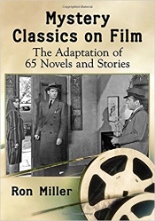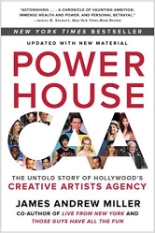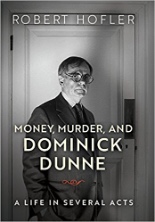 Similar in structure to fellow McFarland & Company releases Now a Terrifying Motion Picture! and Classic Horror Films and the Literature That Inspired Them, yet by a different author, Ron Miller’s Mystery Classics on Film: The Adaptation of 65 Novels and Stories provides a thorough breakdown of the changes that short stories and novels have undergone on their path from the page to 24 frames per second. Tackling works nearly as old as cinema itself and as recent as the Tom Cruise vehicle Jack Reacher, Miller (formerly a syndicated columnist on the topic of the telly) mines a wealth of whodunits for this multimedia survey, reviewing both the source material and the resulting movie with equal devotion and effectiveness. While several bona fide classics are covered — e.g., Alfred Hitchcock’s Rebecca and John Huston’s The Maltese Falcon — Miller makes his work more interesting by deviating often from the usual suspects, most obviously in eschewing the Agatha Christie adaptations And Then There Were None and Murder on the Orient Express for … What Mrs. McGillicuddy Saw. All this, plus Sherlock Holmes, Nancy Drew, Mike Hammer, Auguste Dupin and even that lovable serial killer, Dexter Morgan.
Similar in structure to fellow McFarland & Company releases Now a Terrifying Motion Picture! and Classic Horror Films and the Literature That Inspired Them, yet by a different author, Ron Miller’s Mystery Classics on Film: The Adaptation of 65 Novels and Stories provides a thorough breakdown of the changes that short stories and novels have undergone on their path from the page to 24 frames per second. Tackling works nearly as old as cinema itself and as recent as the Tom Cruise vehicle Jack Reacher, Miller (formerly a syndicated columnist on the topic of the telly) mines a wealth of whodunits for this multimedia survey, reviewing both the source material and the resulting movie with equal devotion and effectiveness. While several bona fide classics are covered — e.g., Alfred Hitchcock’s Rebecca and John Huston’s The Maltese Falcon — Miller makes his work more interesting by deviating often from the usual suspects, most obviously in eschewing the Agatha Christie adaptations And Then There Were None and Murder on the Orient Express for … What Mrs. McGillicuddy Saw. All this, plus Sherlock Holmes, Nancy Drew, Mike Hammer, Auguste Dupin and even that lovable serial killer, Dexter Morgan.
 Few reads can be as addictive as the oral history, and having written ones on SNL and ESPN, James Andrew Miller is arguably a master of them. Now he turns his attention to another set of initials, CAA, in Powerhouse: The Untold Story of Hollywood’s Creative Artists Agency. A 2016 release now in paperback from Custom House, the brick of a book (now with additional material, no less) traces the unlikely rise of CAA from the ashes of five disenchanted William Morris agents to a near-monopoly on the entertainment industry as a whole. Along the way, a classic Cain and Abel story builds between its two most powerful founders, Mike Ovitz and Ron Meyer, but their fallout occurs in the second act; Powerhouse loses its luster after that, arguing for an earlier ending. Absolutely packed with gossip and dozens of unreliable narrators, Powerhouse offers both a business lesson in innovation and a cautionary tale of hubris.
Few reads can be as addictive as the oral history, and having written ones on SNL and ESPN, James Andrew Miller is arguably a master of them. Now he turns his attention to another set of initials, CAA, in Powerhouse: The Untold Story of Hollywood’s Creative Artists Agency. A 2016 release now in paperback from Custom House, the brick of a book (now with additional material, no less) traces the unlikely rise of CAA from the ashes of five disenchanted William Morris agents to a near-monopoly on the entertainment industry as a whole. Along the way, a classic Cain and Abel story builds between its two most powerful founders, Mike Ovitz and Ron Meyer, but their fallout occurs in the second act; Powerhouse loses its luster after that, arguing for an earlier ending. Absolutely packed with gossip and dozens of unreliable narrators, Powerhouse offers both a business lesson in innovation and a cautionary tale of hubris.
 Not for nothing does Robert Hofler’s latest biography, Money, Murder, and Dominick Dunne: A Life in Several Acts, sport chapter titles of pairs, because his jack-of-all-trades subject is a textbook study in duality — and far more than mere separation of the public and private. Although a married (for a time) man with children, Dunne long enjoyed the company of his own gender, via anonymous restroom encounters and even skipping his father’s wake for a backseat coupling. Hofler plays these details not for gossip’s sake, but in crafting a full portrait of a very complex man — one who forever wrestled with guilt and, following the slaying of his daughter, Poltergeist actress Dominique Dunne, turned guilt of another kind into a second-act career as reporter of cause célèbre trials, most notoriously the O.J. Simpson circus. Whether you know Dunne from that journalism work, from the movies he produced (e.g., The Boys in the Band, The Panic in Needle Park) or from the high-society novels he wrote and their tony television adaptations (The Two Mrs. Grenvilles), Hofler — the author behind one of my all-time favorite cultural histories, 2014’s Sexplosion — does one helluva job documenting the life of one helluva interesting guy. —Rod Lott
Not for nothing does Robert Hofler’s latest biography, Money, Murder, and Dominick Dunne: A Life in Several Acts, sport chapter titles of pairs, because his jack-of-all-trades subject is a textbook study in duality — and far more than mere separation of the public and private. Although a married (for a time) man with children, Dunne long enjoyed the company of his own gender, via anonymous restroom encounters and even skipping his father’s wake for a backseat coupling. Hofler plays these details not for gossip’s sake, but in crafting a full portrait of a very complex man — one who forever wrestled with guilt and, following the slaying of his daughter, Poltergeist actress Dominique Dunne, turned guilt of another kind into a second-act career as reporter of cause célèbre trials, most notoriously the O.J. Simpson circus. Whether you know Dunne from that journalism work, from the movies he produced (e.g., The Boys in the Band, The Panic in Needle Park) or from the high-society novels he wrote and their tony television adaptations (The Two Mrs. Grenvilles), Hofler — the author behind one of my all-time favorite cultural histories, 2014’s Sexplosion — does one helluva job documenting the life of one helluva interesting guy. —Rod Lott
